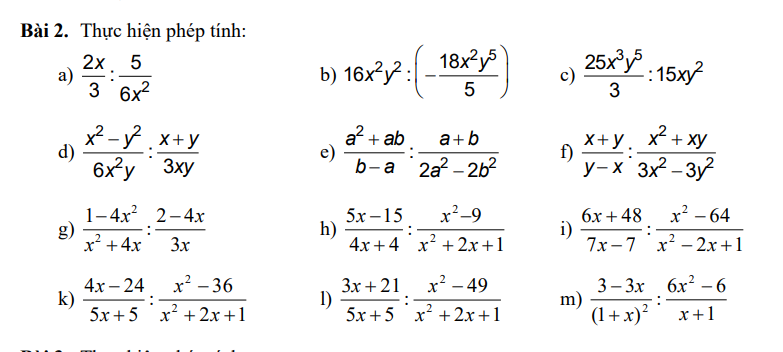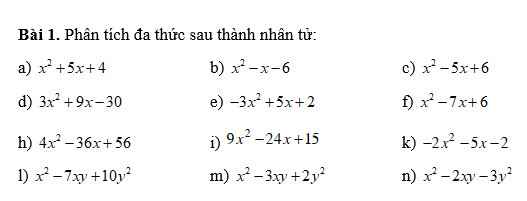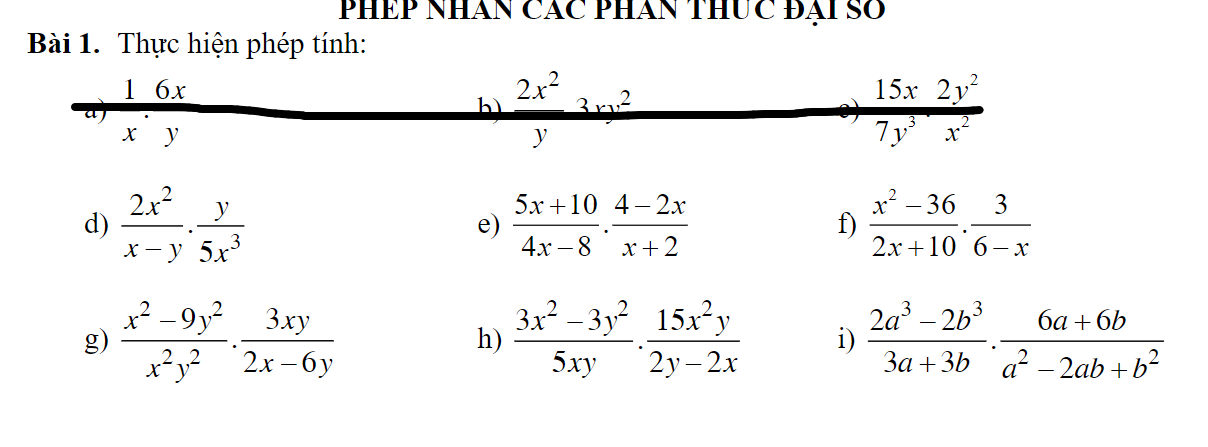
Hãy nhập câu hỏi của bạn vào đây, nếu là tài khoản VIP, bạn sẽ được ưu tiên trả lời.


\(a,=x^2+x+4x+4=\left(x+1\right)\left(x+4\right)\\ b,=x^2+2x-3x-6=\left(x-3\right)\left(x+2\right)\\ c,=x^2-2x-3x+6=\left(x-2\right)\left(x-3\right)\\ d,=3\left(x^2-2x+5x-10\right)=3\left(x-2\right)\left(x+5\right)\\ e,=-3x^2+6x-x+2=\left(x-2\right)\left(1-3x\right)\\ f,=x^2-x-6x+6=\left(x-1\right)\left(x-6\right)\\ h,=4\left(x^2-3x-6x+18\right)=4\left(x-3\right)\left(x-6\right)\\ i,=3\left(3x^2-3x-8x+5\right)=3\left(x-1\right)\left(3x-8\right)\\ k,=-\left(2x^2+x+4x+2\right)=-\left(2x+1\right)\left(x+2\right)\\ l,=x^2-2xy-5xy+10y^2=\left(x-2y\right)\left(x-5y\right)\\ m,=x^2-xy-2xy+2y^2=\left(x-y\right)\left(x-2y\right)\\ n,=x^2+xy-3xy-3y^2=\left(x+y\right)\left(x-3y\right)\)

\(d,=\dfrac{3y}{5x\left(x-y\right)}\\ e,=\dfrac{5x\left(x+2\right)\left(2-x\right)}{4\left(x-2\right)\left(x+2\right)}=\dfrac{-5x}{4}\\ f,=\dfrac{3\left(x-6\right)\left(x+6\right)}{2\left(x+5\right)\left(6-x\right)}=\dfrac{-3\left(x+6\right)}{2\left(x+5\right)}\\ g,=\dfrac{3xy\left(x-3y\right)\left(x+3y\right)}{2x^2y^2\left(x-3y\right)}=\dfrac{3\left(x+3y\right)}{2xy}\\ h,=\dfrac{45x^2y\left(x-y\right)\left(x+y\right)}{10xy\left(y-x\right)}=\dfrac{-9x\left(x+y\right)}{2}\\ i,=\dfrac{12\left(a-b\right)\left(a+b\right)\left(a^2+ab+b^2\right)}{3\left(a+b\right)\left(a-b\right)^2}=\dfrac{4\left(a^2+ab+b^2\right)}{a-b}\)
e: \(=\dfrac{5\left(x+2\right)}{4\left(x-2\right)}\cdot\dfrac{-2\left(x-2\right)}{x+2}=\dfrac{-10}{4}=-\dfrac{5}{2}\)

a) ĐKXĐ: \(\left\{{}\begin{matrix}2x+3\ne0\\2x+1\ne0\\\left(2x+3\right)\left(2x+1\right)\ne0\end{matrix}\right.\)\(\Leftrightarrow\left\{{}\begin{matrix}x\ne-\dfrac{3}{2}\\x\ne-\dfrac{1}{2}\\\left(2x+3\right)\left(2x+1\right)\ne0\end{matrix}\right.\)\(\Leftrightarrow\left\{{}\begin{matrix}x\ne-\dfrac{3}{2}\\x\ne-\dfrac{1}{2}\end{matrix}\right.\)
b) \(\Rightarrow P=\dfrac{2\left(2x+1\right)+3\left(2x+3\right)-6x-5}{\left(2x+3\right)\left(2x+1\right)}\)
\(\Rightarrow P=\dfrac{4x+2+6x+9-6x-5}{\left(2x+3\right)\left(2x+1\right)}\)
\(\Rightarrow P=\dfrac{4x+6}{\left(2x+3\right)\left(2x+1\right)}\)
\(\Rightarrow P=\dfrac{2\left(2x+3\right)}{\left(2x+3\right)\left(2x+1\right)}\)
\(\Rightarrow P=\dfrac{2}{2x+1}\)
c) \(P=-1\Rightarrow\dfrac{2}{2x+1}=-1\\ \Rightarrow2=-2x-1\\ \Rightarrow2x=-3\\ \Rightarrow x=-\dfrac{3}{2}\)


\(\left(x^2-2x+3\right)\left(\frac{1}{2x}-5\right)\)
\(=\frac{x^2}{2x}-5x^2-\frac{2x}{2x}+10x+\frac{3}{2x}-15\)
\(=\frac{x^2}{2x}-5x^2-16+10x+\frac{3}{2x}\)
\(=-5x^2+\frac{x^2}{2x}+\frac{20x^2}{2x}+\frac{3}{2x}-16\)
\(=-5x^2+\frac{x^2+20x+3}{2x}-16\)
học tốt
(x^2-2x+3)(1/2x-5)=1/2x^3-5x^2-x^2+10x+3/2x-15=1/2x^3-6x^2+11,5x-15


 mong các anh chị giúp em làm bài tập làm câu đúng thôi nha anh chị cảm ơn anh chị nhiều.
mong các anh chị giúp em làm bài tập làm câu đúng thôi nha anh chị cảm ơn anh chị nhiều.

17h rùi mà chẳng ai làm, thôi mk làm giúp bn nhé
tận cùng của 1110 = ...........601 - 1 = .............600 chia hết cho 100
( bn thử lai bằng cách 1110 =?)